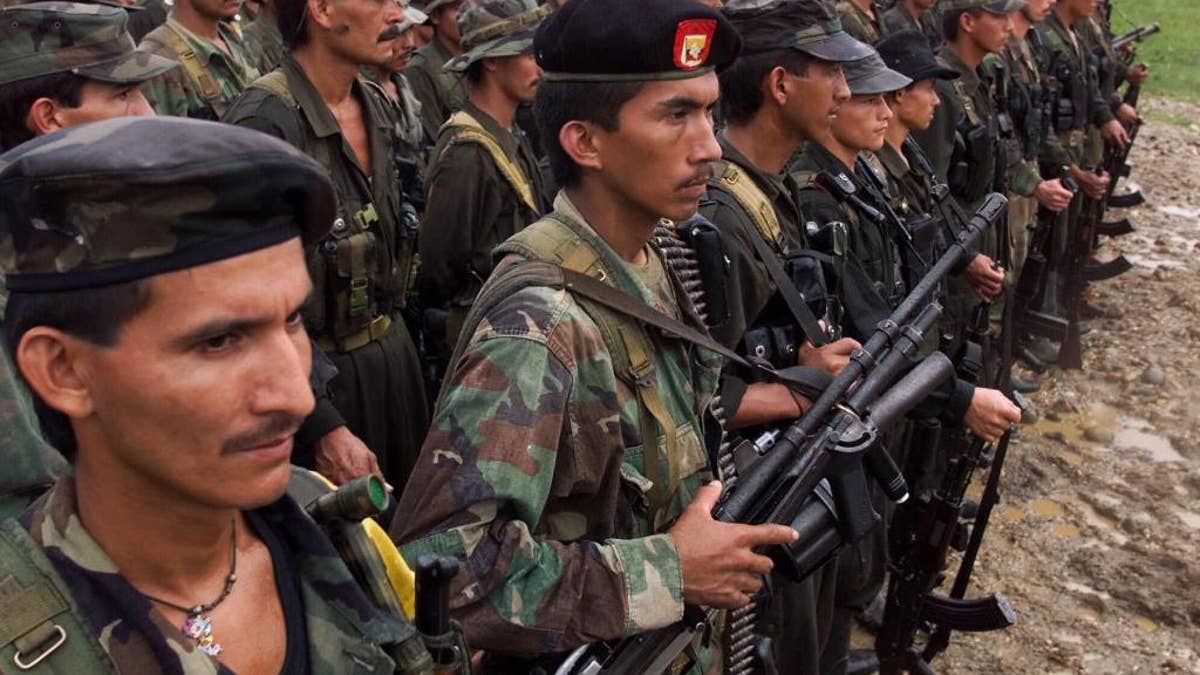
FILE - In this April 28, 2000, file photo, Revolutionary Armed Forces of Colombia, FARC, rebels stand in formation during a practice ceremony for the Boliviarian Movement, a new clandestine political party for the rebels, outside of San Vicente del Caguan in the FARC controlled zone of Colombia. Colombians fear that the peace following the new Nov. 24, 2016 accord, could trigger more bloodshed, as it did following a previous peace process with the FARC in the 1980s when thousands of former guerrillas, labor activists and communist militants were gunned down by right-wing militias, sometimes in collaboration with state agents. (AP Photo/Scott Dalton, File) (The Associated Press)
BOGOTA, Colombia – Colombia's President Juan Manuel Santos is signing, for the second time in under two months, a historic peace accord with leftist rebels. The original accord was defeated in a referendum. Here's a look at how we got here and what lies ahead:
___
REFERENDUM LOSS
President Santos signed an initial peace accord with the Revolutionary Armed Forces of Colombia on Sept. 26 in an elaborate ceremony attended by several heads of state, but voters rejected the deal a week later in a referendum by a razor-thin margin of just 57,000 out of 13 million ballots cast. The defeat came as shock as opinion polls had predicted the "yes" vote would win by an almost two-to-one margin.
___
CHANGES TO ACCORD
Following defeat, Santos returned to the negotiating table to wrest some 50-plus concessions from the FARC ranging from a ban on foreign judges in special tribunals that will judge the rebels' crimes to a commitment by the FARC to forfeit assets obtained through drug-trafficking and other criminal activity. He received a boost in his efforts by being awarded this year's Nobel Peace Prize.
___
WHAT'S NEXT?
Once signed, the accord will be sent to congress where a solid pro-peace majority is expected to easily ratify it in the coming days. After that, the FARC's 8,000-some fighters will begin concentrating in rural areas where they will turn over their weapons to United Nations-sponsored monitors over the next six months.
___
OPPOSITION
Opponents of the accord, led by powerful former President Alvaro Uribe, consider the changes cosmetic. They are threatening to boycott congress and take to the streets to protest what they consider a major blow to Colombia's democracy. They had been pushing for jail time and stronger limits on the political participation of FARC leaders who committed atrocities. Both Santos and the FARC say the accord is the best one possible for Colombia.
___
PROSPECTS FOR PEACE:
The peace deal removes Colombia's largest security threat but there are concerns that criminal gangs and the much-smaller National Liberation Army will fill the void once the FARC pulls out of rural areas it has traditionally dominated. Most of Colombia's homicides have no direct relationship to the guerrillas and even before the peace deals violence related to the conflict had fallen to the lowest level in decades.
